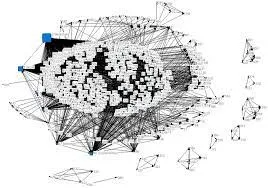Crypto is a complicated sea to navigate, but ultimately, when you break through the initial layer of complexity, it can actually make a lot of things simpler.

I want to talk about two seemingly opposite aspects of crypto and blockchain technology in this post. On one side, we have all the complexities that are present when one is starting their crypto journey, and on the other side, there is the simplicity that it brings once you learn your way around it.
The complexity

Cryptocurrency and blockchains are very complex by nature, and it's vital that we understand and accept that because that is the first step forward. We often discuss what are the things that are holding Hive back, and while people have different views on that topic, onboarding new people is something that's brought up in pretty much every conversation on that subject.
In my opinion, that's true not only to Hive but to crypto as a whole. As we master the basics of this universe, we naturally get more comfortable around it and often forget that getting started was very hard.
The very concept of decentralization is strange to most. The fact that there is no person or entity that "sets the rules" and the inability to recover one's passwords and keys are things that people who are used to a lifetime on web 2.0 take a long time to grasp. The lack of a centralized database and a set of rules enforced as the network owner sees fit are some of the best features of crypto and blockchain, yet they are still perceived as flaws or even bugs by the so-called "normies".
And don't even get me started on Decentralized Finance (DeFi). That's a whole other universe that brings a lot of complexity on its own. Even though many concepts of DeFi are very similar to those of Centralized Finance (CeFi), the way things actually operate is entirely different.
But this is not a post to bash crypto or blockchains. I'm not one of the naysayers that believe this is all hype and will be over soon. On the contrary, as my avatar suggests, I'm a firm believer in the power of tokenization and the many ways that blockchain technology can improve our society. I just needed to state the complex aspect of this technology to make my point.
The simplicity

Once you get through all or most of the obstacles that crypto complexity presents, you may realize that most things are actually simpler on "this side" of the universe. That has a lot to do with the fact that blockchain is universal, meaning that it doesn't face the issues that the "real world" has to deal with, such as different laws, different sets of rules and cultural standards.
The world of finance is a good example because I'm going through something that illustrates this point very well, in my opinion.
I'm currently living in Brazil, and even though I'm getting more and more into crypto, I still have a considerable part of my net worth in the legacy system. I don't know how much of the economic situation of Brazil is talked about in other countries, but while the situation could be a lot worse, it's also not great.
For the last few years, I've managed my assets well enough that I can still make some money with my investments, but as the situation worsens, I'm considering diversifying my investments in FIAT by taking some of it to other countries such as the USA.
That looks great on paper, but the reality is much more complex. Due to issues, I mentioned earlier in this article, such as legislation and the very differences between financial systems, investing in a foreign country is very difficult. There are a few mechanisms that make it easier, such as Investment Funds or ETFs (Exchange Traded Funds), and while I use some of those alternatives, they are all indirect means. If I wanted to invest directly in the USA, for example, I would need an account in an exchange over there which brings all sorts of associated complexities.
Thanks to the borderless nature of crypto that is not really an issue. Sure, you have to learn all those things I talked about initially, but you're pretty much set once you do. You can navigate from project to project with minimal effort. Sure, some chains are different from others, but the transition is much easier.
Take CUB and PolyCUB for example. One is built on BSC, and the other is on Polygon which are separate and different chains, but since I was already comfortable with BSC due to CUB, it only took me a couple of tutorials and, literally, in minutes I was all set to start using PolyCUB. The advent of blockchain bridges such as LeoBridge are promoting cross-chain intermodality, making things even simpler and allowing anyone to invest in projects on multiple chains.
Final thoughts
Getting started in crypto can be very complex and overwhelming, but once you learn the basics and get comfortable with how things work, a whole new world of opportunities is unveiled before you. From there, it's straightforward to make the most of them because blockchains have no borders, no specific laws and no language barrier. Code is law.